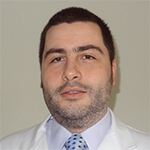Dr. Dellaripa co-founded the Interstitial Lung Disease (ILD) clinic with pulmonologist Hilary Goldberg, MD. The clinic uses a multidisciplinary model to treat patients with inflammatory and fibrotic lung disease. The staff, comprising rheumatologists, pulmonologists, pathologists and radiologists, focus on diagnosing and treating patients with ILD, providing same-day consultations and evidence-based protocols developed from the clinic’s treatment algorithm.
Nine years ago, Dr. Dellaripa initiated a lung-disease-in-rheumatology study group through the ACR, which quickly included both national and international researchers. This group has developed outcome measures particular to patients with lung and rheumatic disease and is now beginning to develop prospective trials. “The goal is to identify at-risk patients for lung disease and limit the morbidity and mortality of this complication,” he says. “When these patients get ill and end up in the ICU, their survival is not great, so early identification and intervention, when appropriate, are important.”
The Challenges of Complexity
Vladimir N. Despotovic, MD, assistant professor of medicine at Washington University in St. Louis, another dual-trained rheumatologist, first came to the U.S. in 1992 as an exchange student at the age of 17. He lived in Michigan for three years and then returned to Serbia in 1995 and enrolled in medical school in Belgrade. He returned to the U.S. in 1999 due to the political and economic environment in the Balkans.

Dr. Despotovic
Although Dr. Despotovic briefly considered a major in mathematics, he was also drawn to medicine. “Both my father and older sister are physicians, so I had great role models throughout my youth,” he says. “My sister wanted me to become an ophthalmologist like her, but I enjoyed the more broad, hands-on internal medicine approach.” His father is an internist, and it was from him that Dr. Despotovic acquired “the love of pathophysiology and immunology, which are my interests to this day.”
Once back in the U.S., he resumed his pre-med studies at Michigan State University in East Lansing. He notes that during his medical training at Wayne State University and subsequent internship and residency at Washington University, he liked most medical subspecialties and was “interested in everything.” His wide-ranging interests have been both “a blessing and a curse for me my whole career,” he says. What eventually drew him to rheumatology was the prominent part played by immunology and the clinical complexity of rheumatologic disorders. “I liked the fact that, as a medical resident, whenever we would have a complex patient, we often called rheumatology for a consult,” he says. “I wanted to be the person who understands that complexity.”

